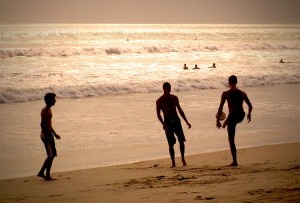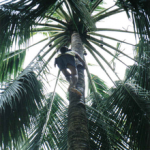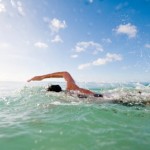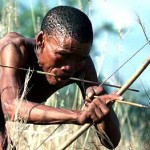Ni abúlé Yorùbá nigbati ko ti si ẹ̀rọ asọ̀rọ̀-mágbèsì tabi ẹ̀rọ amú-òhùn-máwòrán àti ẹ̀rọ ayélujára, àwọn ọmọdé má nkó ara jọ lati ṣe eré lẹhin iṣẹ́ oojọ Bàbá àti Ìyá wọn. Pataki, ni igba ọ̀gbẹlẹ̀ nigbati iṣẹ́ oko din kù.
Àwọn ọmọdé kunrin mẹta bẹ̀rẹ̀ si ṣe eré ìdárayá leti òkun lai bikità ohun ti ó nlọ ni àyíká. Ọmọ kini lérí pé ohun lè gun igi ọ̀pẹ pẹ̀lu ọwọ́ lásá̀n, ekeji ni ohun lè wẹ òkun yi já, ẹni kẹta ni ohun lè ta ọfà si ọ̀run. Àjàpá gbọ́ gbogbo ìlérí àwọn mẹta yi ṣe, ó gbé ìròyìn lọ fún Ọba, pé ohun ti ri àwọn ti ó lè ṣe nkan ti ẹni kan kò ṣerí. Ọba àti àgbà ìlú kò fẹ́ gba ohun ti Àjàpá wi gbọ́ nitori ọgbọ́n ẹ̀wẹ́ rẹ̀, ṣùgbọ́n o ni ki Ọba ṣe ohun ti ó bá fẹ́ fún ohun ti ìròyìn ti ohun mú wá kò bá ṣẹ.
Ọba ránṣẹ́ pé àwọn ọmọdé kunrin mẹta yi, pé ki wọn wa ṣe ohun ti wọn ṣèlérí pé wọn lè ṣe. Yorùbá ni “Ẹnu àìmẹ́nu, ètè àìmétè, ló́ nmú ọ̀ràn bá ẹ̀rẹ̀kẹ́”. Ìbẹ̀rù ba àwọn ọmọ yi, ẹbí wọn bẹ Ọba pe eré ọmọdé lásán ni àwọn ọmọ yi fi sọ gbogbo ohun ti wọn sọ, ṣùgbọ́n ẹ̀pa ò bóró mọ́ gbogbo ará ìlú (àti Àjàpá) ti pé jọ lati wòran. Àwọn ọmọde mẹta yi bẹ̀rẹ̀ si kọ orin arò bayi:
Ọmọdé mẹ́ta nṣère
Éré o, érè ayọ̀ 2ce
Ọ̀kán lóhun yó gọ̀pẹ
Éré o, érè ayọ̀
Ọ̀gọ̀pẹ, ọ̀gọ̀pẹ, ọ̀gọ̀pẹ
Éré o, érè ayọ̀
Ọ̀kán lóhun yó wẹ̀kun
Éré o, érè ayọ̀
Ọ̀wẹ̀kun, ọ̀wẹ̀kun, ọ̀wẹ̀kun
Éré o, érè ayọ̀
Ọ̀kán lóhun ó tafà sọ́run,
Éré o, érè ayọ̀
Ọ̀tàfa, ọ̀tàfa, ọ̀tàfa
Éré o, érè ayọ̀.
Èyi ti ó ni ohun lè gun ọ̀pẹ, dé ìdí ọ̀pẹ pẹ̀lú ẹkún. O gun lẹ̃ kini, ó ṣubú, o gun lẹ̃ keji kọjá ibi tó dé ni àkọ́kọ́ ki ó tó ṣubú. Èyi jẹ ki àwọn ará ìlú bẹ̀rẹ̀ si pàtẹ́wọ́ lati ki láyà, ó bá mú ọ̀pẹ gùn ni ẹ̃kẹta, ó́ gun dé orí. Ariwo sọ, inú ará ìlú dùn. Nigbati ọmọdé keji ti o ni ohun lè wẹ́ òkun ja, gbọ́ ariwo ìdùn nú yi, eleyi ki láyà. Bi ti ẹni àkọ́kọ́, ọmọdé keji ti ó ni ohun lè wẹ òkun já, o wẹ dé odi keji, nibiti wọn ti fi ijó àti ayọ̀ pàdé rẹ. Eleyi ló fún ọmọdé kẹta ni ìgboiyà pe ohun na lè ṣe ohun ti ohun ti ṣe ìlérí rẹ. Ó ta ọfà lẹ̃ kini, ọfà na, kò rin jinà ki o to wálẹ̀. O tã lẹ̃ keji, ọfà yi lọ bi ẹni pé kòní padà̀ si ilẹ̀, ṣùgbọ́n ó tún wálẹ̀ . Ni igbà kẹta ọfà na lọ sókè ọ̀run lai padà. Ariwo sọ, ṣùgbọ́n ìtìjú bo Àjàpá.
- Ọ̀gọ̀pẹ – Palm tree Climber. Courtesy: @theyorubablog
- Ọ̀wẹ̀kun – swimming the ocean. Courtesy: theyorubablog
- Ọ̀tàfa – the arrow man. Courtesy: @theyorubablog
Ọba pàṣẹ, pé ki wọn mu Àjàpá lọ si bodè lati ṣe ìdájọ́ ikú fún, nitori àkóbá ti ó ṣe fún àwọn ọmọde mẹta yi.
ENGLISH TRANSLATION
In the Yoruba Community when there was no Radio or Television and the Internet, children used to gather together to play after the return of the father and mother from the farm. Particularly, during the drought when there is less farming activities.
Three young boys were playing beside at the beach without a care. The first boy boasted that he could climb the palm tree to the top without a rope, the second said he could swim the entire length of the sea, the third boasted louder that he too could shoot arrow to the heaven. The Tortoise who was lurking around heard these conversations, sneaked to the Palace to inform the King and the Elders, that he had seen three boys who could do what has never been done before. His story was not believed, but he stressed that the King should mate out the appropriate punishment if the news he brought was untrue.
The King then sent for the three boys to back up their words. Yoruba said “A mouth that will not stay shut, the lips that will not stay closed, invites trouble for the cheek”. They became afraid and in the company of their families began to plead with the King that they were merely joking, but it was too late as the entire villagers (including the Tortoise) have gathered to watch. So the three boys began to sing sorrowfully about their boastful conversation.
The one that boasted that he could climb to the top of the palm tree began to attempt his climbing in tears. He fell at his first attempt, climbed further at the second attempt before falling. This made spectators to cheer him on, he succeeded at the third attempt and the crowd erupted with joy. His success encouraged the second boy who boasted he could swim the entire length of the sea. He too did not succeed at the first and second attempt but succeeded at the third attempt and the people were thrilled. Their performance made the third boy bold to believe that he could actually achieve what he has boasted about. He shot the arrow to the sky, the first and second time without success but succeeded at the third attempt, the entire community became agog while the Tortoise bowed in shame.
The King commanded, that the Tortoise should be executed at the Towns-gate for implicating the three boys.
Originally posted 2013-09-20 22:16:26. Republished by Blog Post Promoter






